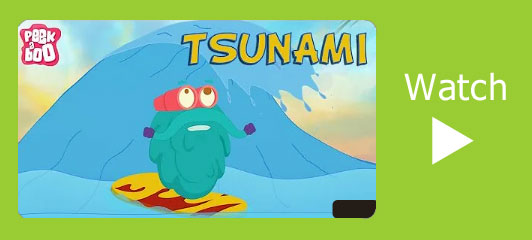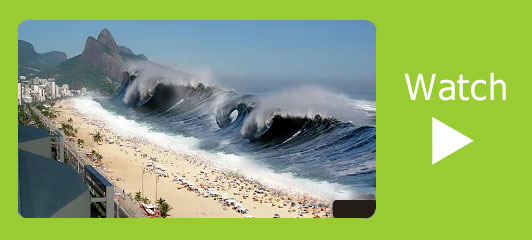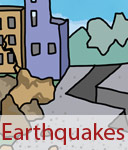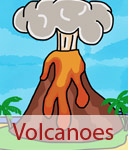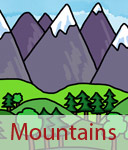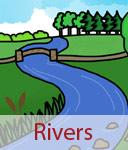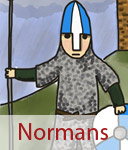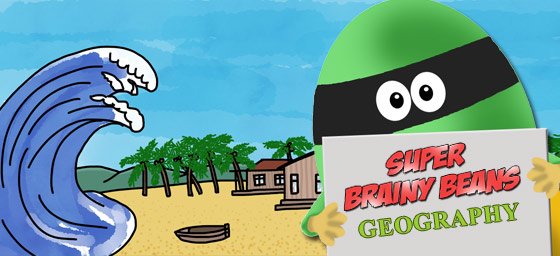
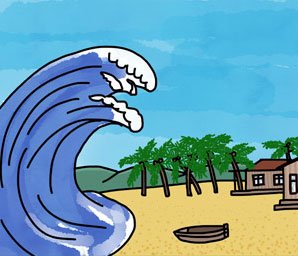
Tsunami facts for kids
Tsunami facts for kids KS2 learning at Primary School. Homework help with how tsunami are formed and what effect they can have on coastlines.
What is a tsunami?
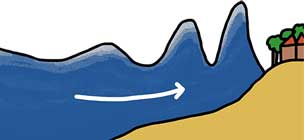 A tsunami is a giant wave that travels across the ocean. Often, it starts as a small ripple far out at sea, but as it moves closer to the land, it grows larger and larger. Some tsunamis can reach heights as tall as a 10-story building! These waves are incredibly powerful and can move entire buildings, cars, and even trees.
A tsunami is a giant wave that travels across the ocean. Often, it starts as a small ripple far out at sea, but as it moves closer to the land, it grows larger and larger. Some tsunamis can reach heights as tall as a 10-story building! These waves are incredibly powerful and can move entire buildings, cars, and even trees.
Tsunamis aren’t just a single wave—they usually come in a series of waves, called a "wave train." The first wave might not be the largest, so it’s very important to stay away from the coast until the danger has passed.
What causes a tsunami?
Tsunamis are usually caused by sudden movements in the ocean. Here are the main reasons:
- Earthquakes: When tectonic plates deep beneath the ocean floor shift or collide, they create a huge amount of energy. This energy pushes the water above it, forming waves.
- Volcanoes: Underwater volcanoes can erupt, releasing magma and gases that displace (move) the water, creating tsunamis.
- Landslides: Sometimes, big chunks of land, like rocks or cliffs, fall into the ocean. The splash can create waves that grow into a tsunami.
- Meteorites: If a space rock hits the ocean, it can cause a massive splash, forming waves. Although this hasn’t happened in millions of years, scientists are always watching the skies, just in case.
When these events occur, the water is pushed away in all directions, forming a tsunami that travels across the ocean at incredible speeds.
 Tsunami Facts: Check out the mighty wave!
Tsunami Facts: Check out the mighty wave!A tsunami is one of the world's most powerful and destructive natural forces. Learn all about these mammoth forces of nature!
 Tsunami facts for kids
Tsunami facts for kidsA tsunami is a series of fast moving waves in the ocean caused by powerful earthquakes or volcanic eruptions.
Why are tsunamis so destructive?
Have you ever stood on a beach and watched the waves crash on the shore? Regular waves roll in, break, and then retreat back into the sea. A tsunami is very different. Instead of crashing and pulling back, a tsunami acts more like a giant wall of water or a flood, surging far inland and sweeping away almost everything in its path.
Here’s why tsunamis are so powerful and destructive:
- Height: Tsunami waves can grow up to 30 metres (100 feet) tall, and sometimes even higher. That’s taller than a 10-story building! Imagine a wave bigger than the tallest building in your town heading towards you.
- Speed: Out at sea, tsunamis can travel as fast as a jet plane (over 500 mph / 800 kmh). By the time they reach the shore, they may slow down a little, but their speed still gives them an enormous amount of energy.
- Force: A tsunami isn’t just water—it’s a powerful surge carrying cars, trees, boats, and even huge chunks of rock. This force can knock down buildings, smash bridges, and uproot forests.
- Flooding: Tsunamis don’t just stop at the beach. They can push water 10 miles (16 km) inland, flooding towns, farmland, and villages. The water may stay for hours or even days, leaving behind mud, debris, and damage.
And remember, tsunamis don’t usually come as a single wave. They arrive as a series of waves called a “wave train.” The first wave may not be the biggest, and larger, more destructive waves often follow. That’s why it’s so important to stay away from the coast after a tsunami warning until experts say it is safe.

Can you outrun a tsunami?
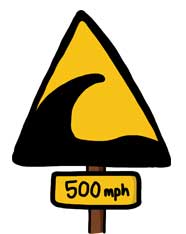 Tsunamis are one of the fastest-moving natural disasters on Earth. Out in the deep ocean, they can travel at speeds of up to 800 kph (500 mph). Even when they slow down near the coast, they still move quicker than any human can run, and often faster than cars can drive on crowded roads. Because of this, it’s impossible to outrun a tsunami.
Tsunamis are one of the fastest-moving natural disasters on Earth. Out in the deep ocean, they can travel at speeds of up to 800 kph (500 mph). Even when they slow down near the coast, they still move quicker than any human can run, and often faster than cars can drive on crowded roads. Because of this, it’s impossible to outrun a tsunami.
So what should you do if you’re near the sea and there’s a risk of a tsunami? The key is to be prepared and act quickly:
- Get to high ground immediately: Don’t wait to see the wave. Move quickly to a hill, mountain, or the upper floors of a strong, tall building. The higher you are, the safer you’ll be.
- Stay away from the beach: Sometimes the sea suddenly pulls back, leaving the seabed and fish exposed. This might look interesting, but it’s actually a warning sign that a huge wave is about to arrive.
- Wait for the all-clear: A tsunami is made of many waves that can come for hours after the first one. Even if the water looks calm again, it can be dangerous to return until experts say it’s safe.
 Weather WizKids
Weather WizKidsA tsunami is a large ocean wave usually caused by an underwater earthquake or a volcanic explosion.
 Disaster Master
Disaster MasterHelp the Heroes in a disaster. Tornados, earthquakes, tsunamis and more.
The impact of tsunamis on people and the environment
Tsunamis are among the most destructive natural disasters in the world, because they affect not only people but also the environment around them.
When a tsunami crashes onto land, it can cause terrible damage to communities. Homes, schools, hospitals, and roads can be completely destroyed. This leaves people without shelter, food, clean water, or a safe place to go. Many families lose their belongings, and sadly, some people lose their lives. Survivors may be separated from loved ones and need help from rescue teams.
The effects of tsunamis don’t stop there. After the waves pass, areas can remain flooded with dirty or salty water, which makes it difficult to rebuild quickly. Diseases can spread when clean drinking water and medical supplies are hard to find. It can sometimes take months or even years for communities to recover fully.
For the environment, tsunamis can be equally destructive. They can:
- Wash away sandy beaches and coastlines.
- Uproot trees and destroy forests near the shore.
- Damage delicate coral reefs, which are important homes for many sea creatures.
- Flood farmland with salty seawater, making it hard for crops to grow.
- Carry pollution, debris, and rubbish far inland or out to sea.
Animals are also affected. Birds, fish, and land animals may lose their homes, while some sea creatures are injured when coral reefs and underwater plants are damaged.
Even though recovery is difficult, people often come together after a tsunami. International aid, rebuilding projects, and environmental care help both communities and nature slowly heal. But it can take a very long time before life returns to normal.

How can we stop a tsunami?
The truth is, we can’t stop a tsunami from happening. They are too powerful and are caused by massive natural events like earthquakes and volcanic eruptions. But scientists and governments around the world have worked hard to find ways to predict tsunamis early and keep people safe.
In places like the Pacific Ocean, where tsunamis are more common, special observation stations and deep-sea sensors watch for underwater earthquakes and sudden changes in sea level. These systems can detect if a tsunami is likely and then send out warnings to people living along the coast. This early warning can save thousands of lives.
Here’s how people prepare for tsunamis:
- Tsunami warnings: When a tsunami is detected, alarms and alerts are sent to phones, radios, TVs, and even loudspeakers in coastal towns. This gives people a chance to escape before the waves arrive.
- Evacuation plans: Coastal towns and villages have special evacuation routes—signs that show the safest way to reach higher ground. Schools and communities often practice drills, so everyone knows what to do if a tsunami warning is given.
- Strong buildings and barriers: Some areas, like parts of Japan, have built tsunami walls, floodgates, and raised shelters to protect people and reduce damage from waves. Tall, strong buildings can also give people a safe place to shelter on upper floors.
- Education and training: Teaching children and adults about what to do during a tsunami is one of the most important ways to stay safe. The more people know, the quicker they can react when a warning is given.
 Stop Disasters Game
Stop Disasters GameLearn the risks posed by natural hazards and manage your resources. Build schools, hospitals, housing and defences to protect the local population.
Amazing facts about tsunamis
- The word “tsunami” comes from the Japanese words “tsu” (harbour) and “nami” (wave). It means “harbour wave” because tsunamis cause the most destruction when they crash into harbours and coastal towns.
- The largest tsunami ever recorded happened in Lituya Bay, Alaska, in 1958. The wave reached an incredible 524 metres (1,720 feet) tall—that’s taller than the Empire State Building and almost as high as the Eiffel Tower stacked on top of Big Ben!
- Tsunamis can cross entire oceans. For example, a tsunami that starts in Japan can travel all the way to the U.S. west coast in less than 24 hours, still carrying enormous power when it arrives.
- Out at sea, a tsunami wave may only be a few feet high, so ships and boats might not even notice it. But when it reaches shallow coastal waters, it slows down and grows into a giant, destructive wall of water.
- Most tsunamis happen in the Pacific Ocean, because it is surrounded by the Ring of Fire—an area with many active volcanoes and frequent underwater earthquakes.
- Some tsunamis move as fast as a jet plane, reaching speeds of 800 kph (500 mph)! That’s about 12 times faster than a cheetah can run.
- Tsunamis don’t usually come as a single wave. They arrive as a series of waves, sometimes lasting for several hours. The second, third, or even later waves can often be the largest and most dangerous.
- In 2004, a huge tsunami in the Indian Ocean was caused by a massive earthquake. The Boxing Day Tsunami was one of the deadliest natural disasters in history, affecting 14 countries and sadly taking the lives of more than 230,000 people.
How to stay safe during a tsunami
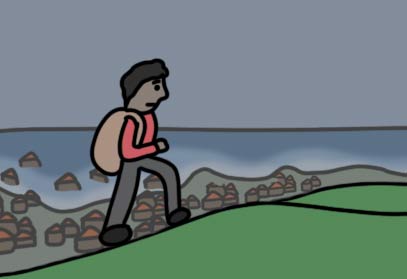
Because tsunamis are so powerful, it’s very important to know what to do if one ever happens. Being prepared can save lives!
- If you feel an earthquake, move to higher ground straight away. Don’t wait for an official warning—many tsunamis are triggered by earthquakes, and the waves can arrive quickly. The faster you move, the safer you’ll be.
- Listen to alerts. Authorities may send tsunami warnings through sirens, radios, TVs, phones, or loudspeakers. Always follow instructions from local officials—they know the safest places to go.
- Stay away from the beach. Even if the sea looks calm, dangerous waves may still be on the way. Remember, tsunamis often come in several waves, and the first one isn’t always the biggest.
- Know your evacuation routes. If you live near the coast, make sure you know where the nearest high ground or tall, safe building is. Practice walking there with your family so you’re ready if it ever happens.
- Be prepared with an emergency kit. A kit should include water, food, a flashlight, batteries, a first-aid kit, and important documents. Having these ready means you can leave quickly and still have what you need.
- Help others if you can. Children, the elderly, or people who need assistance might struggle to evacuate. If it’s safe, help guide them to safety.
By learning about tsunamis and practising safety steps, we can protect ourselves and our communities. Prepared people are more likely to stay calm and make the right choices in an emergency.

